Does Health Insurance Cover Urgent Care

Table of Contents
Does Health Insurance Cover Urgent Care? A Comprehensive Guide
Navigating the world of healthcare and insurance can be confusing, especially when you're facing an unexpected medical issue. One common question that arises is: Does my health insurance cover urgent care? The short answer is usually yes, but there are important details to consider.
Understanding Urgent Care vs. Emergency Room
Before diving into insurance coverage, it's essential to understand the difference between urgent care and an emergency room (ER):
-
Urgent Care: Treats non-life-threatening medical conditions that require prompt attention but aren't emergencies. This includes things like:
- Minor cuts and burns
- Sprains and strains
- Flu and other illnesses
- Ear infections
- Urinary tract infections
-
Emergency Room: Handles life-threatening emergencies and critical injuries. Examples include:
- Heart attack
- Stroke
- Severe bleeding
- Broken bones (in some cases)
- Loss of consciousness
How Health Insurance Covers Urgent Care
Most health insurance plans do cover urgent care visits, but the extent of coverage varies. Here's a breakdown of important factors:
1. Plan Type:
- HMO (Health Maintenance Organization): Requires you to choose a primary care physician (PCP) and often need a referral for urgent care.
- PPO (Preferred Provider Organization): Offers more flexibility and may not require referrals, but costs more.
- POS (Point of Service): Combines elements of HMO and PPO, requiring referrals for out-of-network providers.
2. Deductibles and Co-pays:
- Deductible: The amount you must pay out-of-pocket before your insurance begins covering costs.
- Co-pay: A fixed amount you pay per visit, regardless of the total cost.
Your insurance plan details will outline the specific deductibles and co-pays for urgent care visits.
3. Network Coverage:
- In-Network Providers: Urgent care facilities that have a contract with your insurance company.
- Out-of-Network Providers: Facilities not in your network.
Your out-of-pocket costs will be significantly higher for out-of-network urgent care visits.
4. Pre-authorization:
Some insurance plans may require you to obtain pre-authorization from your insurance company before visiting an urgent care facility. This ensures that the visit is medically necessary and helps avoid surprises with your bill.
Tips for Maximizing Urgent Care Coverage
- Check your plan details: Carefully review your insurance plan's coverage for urgent care, including deductibles, co-pays, and network limitations.
- Contact your insurance provider: If you have questions about coverage or need to understand specific details, reach out to your insurance company for clarification.
- Choose in-network providers: Whenever possible, opt for urgent care facilities within your insurance network to save money.
- Consider pre-authorization: If your plan requires pre-authorization, make sure to obtain it before visiting an urgent care facility.
When to Consider Urgent Care vs. ER
While urgent care is a convenient option for non-life-threatening conditions, it's important to know when to seek emergency medical care:
- Severe pain or discomfort: If you experience intense pain, difficulty breathing, or any other alarming symptoms, go to the ER immediately.
- Life-threatening symptoms: If you believe you are experiencing a heart attack, stroke, or any other life-threatening condition, call 911 or go to the ER right away.
- Uncertain about the severity: If you're unsure whether your condition requires urgent care or an ER visit, it's always best to err on the side of caution and seek emergency medical care.
Conclusion
Understanding your health insurance coverage for urgent care is crucial for making informed decisions about your healthcare. By knowing your plan details, choosing in-network providers, and understanding when to seek emergency care, you can navigate the healthcare system confidently and avoid unexpected expenses. Remember, your health is your priority, and seeking prompt medical attention is always essential.

Thank you for visiting our website wich cover about Does Health Insurance Cover Urgent Care. We hope the information provided has been useful to you. Feel free to contact us if you have any questions or need further assistance. See you next time and dont miss to bookmark.
Featured Posts
-
Daniel Craigs Bond Casting Choice I Dont Care
Nov 08, 2024
-
American Singer Joins Bst Hyde Park Lineup
Nov 08, 2024
-
What Eye Doctor Takes Wellcare Insurance
Nov 08, 2024
-
Guggenheim Investment Banking Internship
Nov 08, 2024
-
Buy Noah Kahan Bst Hyde Park Tickets 10am
Nov 08, 2024